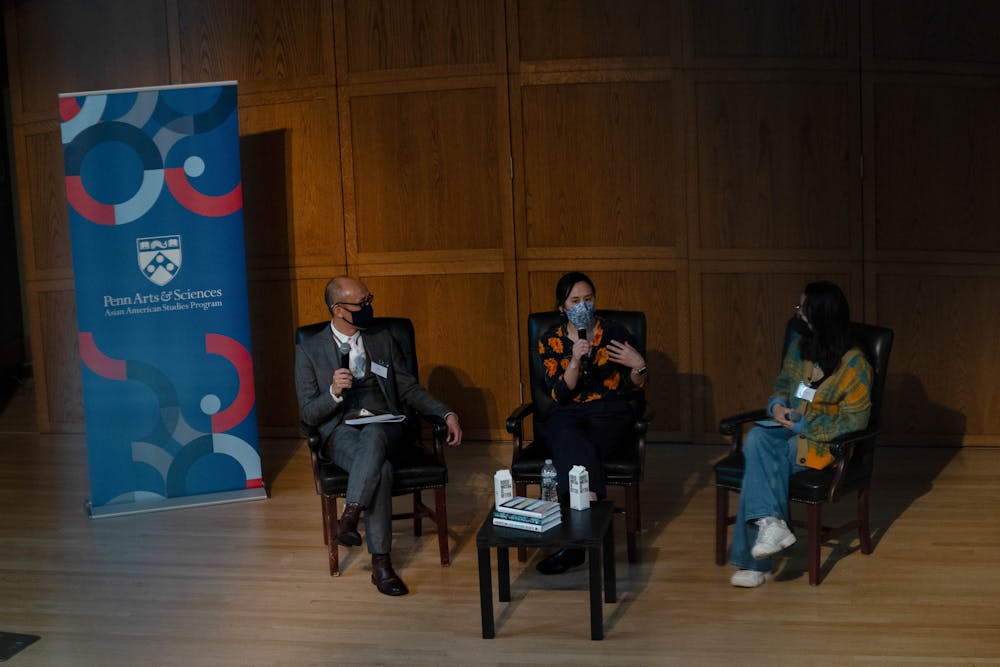“We’ve clearly coordinated this very carefully.” Celeste Ng’s opening comment is met with a round of laughter in the audience. She’s the guest speaker for the March 27 event at the Penn Museum's Widener Hall, which is starting 15 minutes later than advertised. No one’s angry at the late start, but they are impatiently awaiting to hear what wisdom the acclaimed novelist is soon to bestow.
Every year, Penn’s Asian American Studies Program invites a distinguished speaker in memoriam of Yoonmee Chang. While pursuing her Ph.D. in English, Chang was integral in establishing the ASAM program at Penn. Following her untimely passing in 2018, the ASAM faculty, in tandem with her mother, Woonsuk Debbie Chang, annually hosts the Yoonmee Chang Memorial Lecture to celebrate and honor her acclaimed academic achievements.
“Celeste’s name was number one on our list,” Faculty Director David Eng explains, though their decision to invite Ng requires no explanation. Author of Everything I Never Told You, Little Fires Everywhere—which was adapted into a Hulu mini–series—and most recently Our Missing Hearts, Ng’s work has received critical acclaim and worldwide recognition. There’s no denying Ng was meant for a career in literature since her childhood.
“I was always the weird kid off in the corner reading a book and writing plays and making my cousins act them out,” she laughs. Despite coming from a family deeply entrenched in STEM, Ng’s parents always fostered a passion for the arts in her.
“If I got straight A’s, we could go to the bookstore, and they would buy me any book,” she says. In reality, despite the motivation of these rewards, they were practically insignificant; her parents were constantly buying books for her. She recalls how, every time a bookshelf began to overflow, her father would just build a new one.
This artistic upbringing meant her parents weren’t exactly surprised at her desire for a career in writing, but they were notably cautious in their support. Ng explains her father’s initial reaction to her pursuing an MFA in English: “You already speak English.” Her mother’s reaction was to research the endeavor, which led to an endearing email confirming that an MFA in English was, in fact, a “real degree.”
Ng concludes that this cautiousness stemmed from the lack of guaranteed success in the field of writing. “In physics, there’s a right answer,” she explains. But writing is a whole different ballpark, one much more subjective that allows more judgment. Ng sympathizes with her parents’ desire to protect her from a career that can so easily allow unfair judgment since they have been overly critiqued in their professional lives. Ultimately, her stubbornness won out. Ng knew she would be a novelist, and her parents graciously accepted her fate.
Still in spite of straying from a STEM background, Ng has since come to realize that her approach to writing is certainly a scientific one—it relies on observation and questioning. “I’m an introvert who loves people,” Ng says. “So people are super fascinating, but I hate parties.” This dichotomy, she acknowledges, has made her heavily observant of people and their dynamics. It has also informed her approach to novel writing. She starts with a question and seeks an answer through keen observation of her characters.
Her second novel, Little Fires Everywhere, began with a very simple question, “Why would a girl burn down her house?” Ng then spends over 300 pages searching for that answer, spinning intricate webs between characters while simultaneously working to untangle them. The end result was an award–winning novel that solidified Celeste Ng’s name in the literary world.
Questioning things is how Ng always approaches her writing, and it allows her to explore many topics from a nuanced perspective. She explores race, mental health, reproductive care, and many others in her work by letting her own uncertainties surrounding the topics guide the narrative. Ultimately, she strives to further the conversation, to expand readers’ concepts of right and wrong, not by presenting straightforward morals through clean answers, but by letting things settle uneasily. “A great disappointment to the high schoolers who write to me and ask, ‘What is the moral?’,” she laughs.
Ng goes so far as to question her own work. Her latest novel, Our Missing Hearts, was written almost in response to Little Fires Everywhere. While the latter focuses on the bond between a struggling artist and her understanding daughter, Ng begins to question what that dynamic might look like for a parent–child relationship where the child doesn’t understand their parent’s need to create art. She explores the tension and feelings of abandonment of a son struggling to cope with a distant mother dedicated to her poetry.
Ng’s curiosity for the world around her has been an endless supply of inspiration. Already, she teases a new novel she’s been working on. She finds a certain type of power that comes with fiction, one that allows a space to imagine that things can be different. As she explores increasingly polarizing issues through her characters and ones that she grapples with in her own life, she finds that imaginative space to be one of comfort. “Art,” she says, “is what helps me get through things.”







